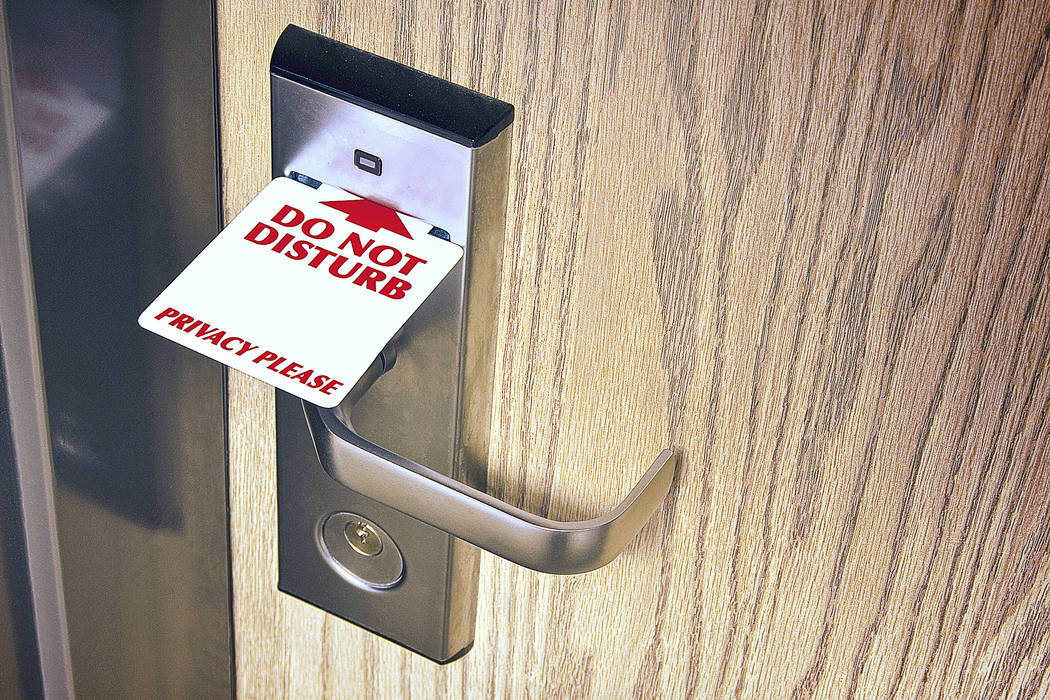‘Do not disturb’ signs get another look after Las Vegas shooting
When a “Do Not Disturb” sign hangs outside a hotel room for a while, staff will usually call or knock at some point to make sure everything’s OK.
But in the wake of the Las Vegas shooting, hotel operators may be asking themselves: How long should we wait before contacting guests who want to be left alone?
A gunman broke two windows in a 32nd-floor Mandalay Bay suite and sprayed bullets at concertgoers across the street on Oct. 1. Armed with at least 23 firearms, he killed 58 people at the Route 91 Harvest festival and left hundreds injured in the deadliest mass shooting in modern U.S. history, and then he killed himself. He may have been able to prepare for the attack because housekeeping staff didn’t enter the room for some time.
People don’t want to be “inconvenienced” in the hospitality industry — they want to “get pampered” and don’t want to stand in lines, Clark County Sheriff Joe Lombardo recently told the Las Vegas Review-Journal.
The Transportation Security Administration sparked complaints among flyers nationwide, but now “it’s a way of life” and “it’s important for us to take that same stance moving forward,” including checking baggage, Lombardo said.
With “Do Not Disturb” signs, he said, “does that mean hands-off, no interaction completely or, ‘Yeah, we understand that, sorry we woke you up, but we gotta look … This is our facility, not yours.’”
“All those things have to be measured,” Lombardo said.
Steve Wynn, chairman and CEO of Wynn Resorts Ltd., told Fox News in a segment that aired last Sunday that if “a room goes on ‘Do Not Disturb’ for more than 12 hours, we investigate.”
“The scenario that we’re aware of … indicated that (the shooter) didn’t let anyone in the room for two or three days,” said Wynn. “That would have triggered a whole bunch of alarms here.”
A holed-up guest might be ill, he added, and staff would check to see if they’re safe.
Wynn Resorts Chief Marketing Officer Michael Weaver said in a statement to the Review-Journal that the 12-hour policy was implemented “shortly after the recent tragedy.”
Details of the shooter’s stay at Mandalay Bay still are in flux. Lombardo recently said the gunman checked in Sept. 25, three days earlier than previously reported, and spent the first three days in a separate room before moving to the corner suite from which he launched the rampage.
It’s also unclear whether a check by hotel staff could have prevented the massacre. Guests with “Do Not Disturb” signs can tell hotel workers that everything is fine, prompting staff to leave them be, according to Kevin Murphy, an associate professor at the University of Central Florida’s Rosen College of Hospitality Management.
No industrywide standard
There is no industrywide standard for how long hotels wait before trying to make contact with guests, said Dick Hudak, founder of Florida-based Resort Security Consulting. He said 12 hours is “too soon,” but he agreed that policies can vary based on the owner, the hotel and the guest.
Typically, hotels require that rooms with a Do Not Disturb request be entered for routine cleaning after three days, although with some companies, workers enter for a courtesy cleaning after 24 hours, American Hotel & Lodging Association spokeswoman Rosanna Maietta said.
Hotels’ first concern is guest safety, said Steven Carvell, a finance professor at Cornell University’s School of Hotel Administration. They need to ensure, for instance, that a guest isn’t dead or unconscious.
Illegal activity can happen in any hotel. But it’s far more common to worry about a guest’s health than to worry a guest is stockpiling weapons, according to Murphy.
“When’s the last time you heard someone had 23 assault rifles in their hotel room,” he said.
Many facts ‘still unverified’
Asked if hotels would review or change their policies in light of the massacre, Carvell said that “everybody always reviews everything” after a tragedy like this.
“Why would they not?” Carvell said.
Efforts to gain comments from Mandalay Bay owner MGM Resorts International were unsuccessful.
In a statement sent to reporters late Tuesday by an outside public-relations firm, MGM spokeswoman Debra DeShong said, “many facts are still unverified and continue to change as events are under review.”
She also said, in an apparent reference to a recent Metropolitan Police Department briefing on the shooting, that MGM “cannot be certain about the most recent timeline that has been communicated … and we believe what is currently being expressed may not be accurate.”
She did not elaborate.
“We understand the public’s desire for information,” DeShong said, but “it is not appropriate for us to comment further at this time on what remains an open matter for law enforcement.”
Contact Eli Segall at esegall@reviewjournal.com or 702-383-0342. Follow @eli_segall on Twitter.






















